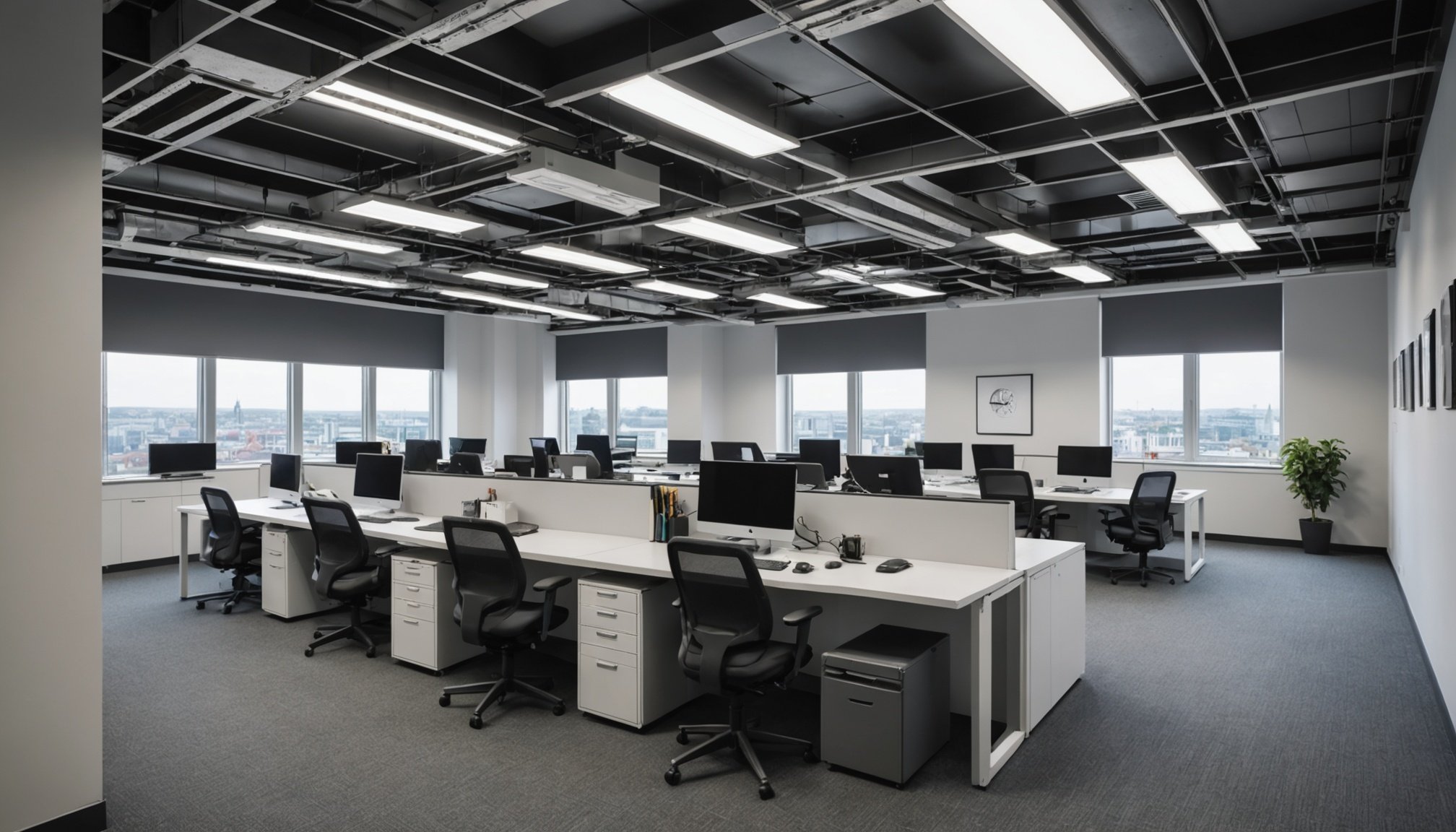Understanding HVAC Energy Efficiency
Improving HVAC energy efficiency is crucial for UK workspaces, where energy consumption remains a significant concern. HVAC systems are responsible for heating, ventilation, and air conditioning, consuming substantial energy across various industries. With spiralling energy costs, focusing on efficiency becomes more pivotal than ever.
Energy-saving strategies in workplaces enhance comfort and productivity while reducing operational costs. Achieving this in an environmentally responsible way aligns with current regulations. These regulations are increasingly stringent, encouraging businesses to adopt energy-efficient practices and technologies.
Also read : Revolutionizing Urban Real Estate Forecasting: The Power of AI Unleashed
Recent legislation in the UK shapes how businesses approach HVAC energy performance. Compliance with these laws not only helps in reducing energy consumption but also opens up avenues for government incentives. These incentives support firms investing in efficient systems, easing the transition to a greener operation model.
The role of HVAC systems in energy consumption necessitates awareness and action. Adopting energy-saving strategies can significantly benefit UK workspaces, both financially and environmentally. By understanding the landscape and adhering to regulations, workplaces can make strides towards a more sustainable and economically sound future. With the right approach, achieving notable improvements in energy efficiency is not just feasible but also suggests a strategic advantage.
Topic to read : Revolutionizing Urban Real Estate Forecasting: The Power of AI Unleashed
Innovative HVAC Optimization Techniques
Modern technology offers a vast array of cutting-edge HVAC techniques aimed at enhancing energy efficiency. These optimization strategies are essential for improving energy consumption in commercial environments, focusing on three primary approaches: smart thermostat integration, variable speed drives, and demand-controlled ventilation.
Smart Thermostat Integration
Smart thermostats are pivotal in maintaining optimal temperatures while minimizing energy use. They achieve this by learning user preferences and adjusting settings automatically. This precision improves energy efficiency, offering considerable cost savings by reducing unnecessary heating or cooling.
Variable Speed Drives
Variable speed drives (VSDs) adjust the motor speed of HVAC systems, providing substantial energy savings. Unlike traditional systems, VSDs moderate power depending on demand. This not only conserves energy but also extends equipment lifespan by reducing wear and tear.
Demand-Controlled Ventilation
Demand-controlled ventilation systems adjust air supply based on real-time occupancy levels. This innovation is vital for workplaces aiming to reduce HVAC energy consumption. By providing air precisely when needed, these systems significantly cut energy use and improve internal air quality.
Implementing these technologies demonstrates tangible improvements in energy efficiency, cutting costs and benefitting UK businesses environmentally, ensuring compliance with tightening efficiency regulations.
Technology Comparisons for Energy Efficiency
Choosing the right HVAC technology can drastically improve energy efficiency. Traditional systems are steadily being replaced by more advanced and energy-efficient models. When comparing traditional vs. modern HVAC systems, modern technology offers superior benefits, including reduced energy consumption and improved performance metrics. These energy-efficient systems utilize components such as variable speed drives and smart thermostats, which optimize operation based on demand, thereby delivering significant cost savings.
Renewable energy integrations into HVAC systems are becoming increasingly popular, offering further enhancements in efficiency and sustainability. These integrations ensure systems not only use less energy but also source their power from cleaner, renewable sources such as solar or wind power. This change is especially relevant in the UK, where environmental regulations push for lowering carbon emissions in workspaces.
Another cutting-edge development is air quality monitoring technologies. These technologies enable more accurate control of air circulation, ensuring optimal indoor air quality while minimizing energy expenditure. Insights from various UK case studies reveal that businesses adopting advanced HVAC technologies see a direct positive impact on sustainability and operational costs, reflecting a growing trend towards greener and more efficient workspaces.
Regulatory Guidelines and Support
In the UK, HVAC energy efficiency regulations have become increasingly crucial, ensuring that businesses align with national and environmental goals. These regulations focus on reducing energy consumption, which is significant for both businesses and the environment. Key regulations emphasize the importance of adopting energy-efficient HVAC systems, ensuring that UK workspaces contribute positively to sustainability targets.
Energy efficiency standards demand compliance for new installations and upgrades, promoting the use of cutting-edge HVAC techniques. Adhering to these standards not only improves HVAC systems’ efficiency but also ensures that businesses meet mandatory environmental benchmarks.
The UK government has introduced various incentives to support firms transitioning to efficient systems. Incentives, such as grants and tax relief, make upgrades economically feasible and appealing. These programs aim to encourage the adoption of advanced HVAC technologies, showcasing how energy-efficient solutions can lead to significant long-term savings.
Businesses that comply with regulations gain not only financial benefits but also enhanced reputations for environmental responsibility. Achieving environmental compliance is increasingly viewed as a business advantage, providing a competitive edge in both local and global markets.
Case Studies and Real-World Applications
In exploring HVAC case studies, numerous UK business practices have emerged as inspiring energy efficiency success stories. Real-world applications present valuable insights into the practical adoption of innovative technologies and strategies.
Successful Implementation Examples
Leading UK companies have showcased successful implementation of HVAC systems, leading to considerable energy savings. For instance, a major retail chain reported a 30% reduction in energy consumption after integrating smart thermostats and demand-controlled ventilation. These improvements not only reduced costs but significantly improved internal climate control, enhancing customer experience.
Lessons Learned from Failed Integrations
On the flip side, analysing failed integrations offers crucial insights. Instances where businesses attempted deployment without sufficient planning often resulted in underperformance. A common lesson is the importance of customising solutions to fit specific operational needs rather than adopting a one-size-fits-all approach.
Future Trends in HVAC Systems
Emerging future trends in the HVAC landscape include increased use of renewable energy sources and smarter, AI-driven control systems. These advancements promise even greater energy efficiency improvements and align with the growing trend of sustainability in UK workspaces. Keeping abreast of these trends is crucial for businesses aiming to remain competitive and environmentally responsible.
Conclusion
Incorporating sustainable HVAC practices paves the way for a brighter future, particularly in UK workspaces where embracing energy efficiency is crucial. Comprehending the importance of HVAC optimization techniques offers insightful strategies for keeping operational costs in check while enhancing environmental benefits. Facilities must prioritize systems like smart thermostats and variable speed drives, aligning with current energy efficiency standards.
Facility managers and business owners can take actionable steps to ensure their premises remain forward-thinking and eco-friendly. Transitioning to newer, energy-efficient systems promises significant cost savings and a reduced carbon footprint. Successfully navigating HVAC regulations UK unlocks opportunities for economic incentives, making upgrades more feasible.
- Leverage government incentives and support programs for funding system improvements.
- Prioritize future trends by staying abreast of emerging HVAC technologies like AI-driven controls.
- Tailor energy efficiency strategies to fit specific workplace needs for optimal results.
Moving forward with comprehensive energy strategies not only benefits the environment but also provides workplaces with a competitive advantage, ensuring environmental compliance and improved market positioning. Investing in efficiency today secures a sustainable tomorrow.





